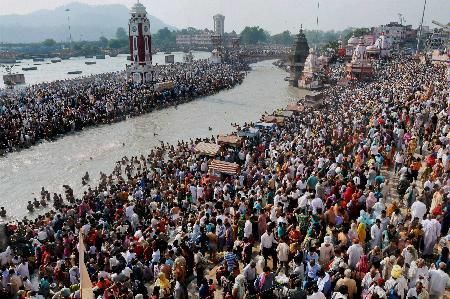
Kolkata, October 17: The holy Ganga is a poison river today. It's so full of killer pollutants that those living along its banks in Uttar Pradesh, Bihar and Bengal are more prone to cancer than anywhere else in the country, says a recent study.
Conducted by the National Cancer Registry Programme (NCRP) under the Indian Council of Medical Research, the national study throws up shocking findings. The river is thick with heavy metals and lethal chemicals that cause cancer, it says.
"We know that the incidence of cancer was highest in the country in areas drained by the Ganga. We also know why. Now, we are going deeper into the problem. Hopefully, we'll be able to present a report to the Union health ministry in a month or two," NCRP head A Nandkumar said.
The worst-hit stretches are east Uttar Pradesh, the flood plains of Bengal and Bihar. Cancer of the gallbladder, kidneys, food pipe, prostate, liver, kidneys, urinary bladder and skin are common in these parts. These cases are far more common and frequently found here than elsewhere in the country, the study says.
Even more frightening is the finding that gallbladder cancer cases along the river course are the second highest in the world and prostate cancer highest in the country. The survey throws up more scary findings: Of every 10,000 people surveyed, 450 men and 1,000 women were gallbladder cancer patients. Varanasi in Uttar Pradesh, Bihar's Vaishali and rural Patna and the extensive tract between Murshidabad and South 24-Parganas in West Bengal are the hot zones. In these parts, of every 1 lakh people surveyed, 20-25 were cancer patients. This is a national high. Relentless discharge of pollutants into the riverbed is responsible.
"This is the consequence of years of abuse. Over years, industries along the river have been releasing harmful effluents into the river. The process of disposing of waste has been arbitrary and unscientific. The river and those living along its banks are paying a price for this indiscretion," Chittaranjan National Cancer Institute director Jaideep Biswas said. The Kolkata-based cancer institute is an associate of the National Cancer Registry Programme.
Biswas, a senior oncologist, said Ganga water is now laced with toxic industrial discharge such as arsenic, choride, fluoride and other heavy metals. Dipankar Chakarabarty, director, Jadavpur University School of Environmental Studies, concurs. "We've been extremely careless. Indiscriminate release of industrial effluents is to blame for this."
"The arsenic that's gets into the river doesn't flow down. Iron and oxygen present in the water form ferroso ferric oxide, which in turn bonds with arsenic. This noxious mix settles on the riverbed. Lead and cadmium are equally heavy and naturally sink in the river. This killer then leeches back into the groundwater, making it poisonous," Chakrabarty explains.
Surface water, Chakrabarty explains, is treated before use. But that's clearly not the case with groundwater and it's mostly consumed raw, often straight from source. The impact is devastating. "The consequences of using or drinking this poison can manifest earliest in two years and latest in 20. But by then, it's way too late." Those who've been bathing in this poison river are equally at danger, says Biswas. The need of the hour is to strictly implement laws regulating discharge of industrial waste into the river.






Comments
Add new comment